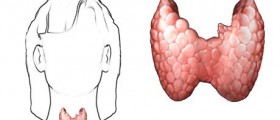
Hyperthyroidism
Hyperthyroidism is the other name for the high or overactive thyroid gland. This condition is marked by the overproduction of two thyroid hormones, T4 and T3. The thyroid gland is one of the most important glands in the human body, it is placed in the front of the neck and has the shape of a butterfly. This gland is important because it manufacture two hormones that regulate the metabolism of the body and also helps in a proper functioning of many organs in the body, such as heart, muscles or bones. The level of cholesterol also depends on the thyroid gland hormones.
When the thyroid gland due to some factors begins to secrete too much of its hormones, hyperthyroidism occurs. The main consequence of this condition is the speeding up of many things in the body, such as fast metabolism, rapid heart beating or a lot of sweating may occur. It is very important to treat this condition. Otherwise, if it is left untreated, it can lead to certain complications related to the heart, muscles, and bones. The most serious complication of hyperthyroidism is a condition named thyroid storm.
Causes and symptoms of hyperthyroidism
In the majority of cases, hyperthyroidism is caused by Graves’ disease, which is a medical term for the autoimmune disease when the body’s immune system produces antibodies that attack the thyroid gland. As a consequence, the thyroid gland tends to secrete excessive amounts of its hormones. Hyperthyroidism is a condition that can be inherited also, because it runs in family. Furthermore, this condition may be cause by thyroid nodules, which are small growths in the thyroid gland, or by a swollen thyroid.
Hyperthyroidism is a condition that has many symptoms, but the most common warning sings are nervousness, mood swings, fatigue and weakness, as well as hand trembling, shortness of breath and rapid heart beats. Furthermore, people who suffer from this condition may also experience excessive sweating, red and itchy skin, hair loss and losing body weight despite increased appetite. In women, hypothyroidism may cause certain menstrual irregularities, such as heavy and excessive menstruation, missing of menstrual periods and breast enlargement.
Symptoms of Graves’ disease
Those people who develop hyperthyroidism due to Graves’ disease have several additional symptoms. The most frequent symptoms of Graves’ disease are enlarged but painless thyroid gland, fingers with wide tips and thickened nails that tend to lift off the nail beds. Furthermore, muxedema and Graves’ ophthalmopathy are two medical conditions that are also the symptoms of Graves’ disease.















-And-Children-16-Warning-Signs-And-Symptoms_f_280x120.jpg)

Your thoughts on this
Loading...